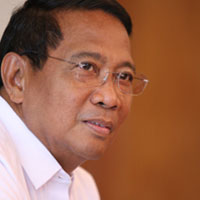MANILA — Vice President Jejomar C. Binay, concurrent Presidential Adviser on OFW concerns, has assured US government officials of the Philippines’ commitment to end human trafficking, as he exchanged concerns over how it would impact on US aid via the Millennium Challenge Corporation (MCC).
In the past two years, the Philippines was included in the Tier 2 watch list of the US State Department. Countries under this category are cited for making significant efforts to meet standards set by the US government.
Still, being in that list for sometime is an issue of concern. Accordingly, in a conference with Luis CdeBaca, Head of the State Department’s Office to Monitor and Combat Trafficking in Persons, Binay expressed that “the Philippine government is committed to put in place needed government reforms and policies to add teeth to the anti-human trafficking drive.”
The Philippine Inter-Agency Council Against Trafficking in Persons (IACAT) where Binay is chair emeritus, has reported that 39 human trafficking convictions have been made since 2003.
The Vice President reiterated this concern in a dialogue with the Filipino community in Washington as he conveyed the government’s efforts in addressing issues OFWs faced, including illegal recruitment and trafficking in persons.
Binay has just returned from a week-long working visit to the US, meeting not only US government and World Bank officials but also Filipino community leaders.
The Vice President also attended the yearly National Prayer Breakfast as a guest of the US Congress, an event usually addressed by the US President.
His media handlers said Binay is “fully satisfied with the results of his talks with World Bank experts, top US government officials, policy think tanks, American business leaders and the Filipino community.”
“I believe the visit had a positive impact on the deepening relations between the Philippines and the United States as well as our ties with our most important development partners abroad,” the Vice president said in his report of the visit.
The Vice President keynoted the disaster risk reduction and management (DRRM), and urban development sessions of the World Bank Sustainable Development Network (SDN).
As former long-time City Mayor of Makati, Binay reported he was honored to learn that World Bank officials regularly cites Makati as “a role model in urban development when talking to other developing countries.”
At the SDN meeting, he was reportedly assured of the Bank’s support for Philippine programs in disaster risk reduction and urban development.
At the same SDN meeting, Binay talked of Makati’s experiences and strategies to adapt to and mitigate disaster risks given the country’s premier city’s growing urbanization as well as his current plans as chairman of the Housing and Urban Development Coordinating Council (HUDCC), the umbrella shelter agency.
He also shared the possibility of scaling up the “Makati experience” to the national level. He guaranteed the World Bank that the Aquino administration is committed to integrating DRRM programs in its national development agenda.
“For that reason, they assured us of continued support for our programs and projects related to disaster reduction and management, and urban development,” Binay said.
In a separate meeting with WB officials, Binay urged them to assist countries like the Philippines in tapping their renewable energy potential and redirecting its support for resources such as fossil fuels.
“There’s a way to address energy poverty in a carbon-constrained world. It’s not just about connection, it’s about access. The World Bank needs to rapidly shift away its resources from polluting energy resources and shift to support developing countries harness sustainable energy,” Binay said.
The OVP noted that the Philippines is second to the United States in terms of producing geothermal energy. With the support of the World Bank, Binay said he is optimistic that the country will outdo the US by 2014.
Binay also met with Shaun Donovan, Secretary of the Department of Housing and Urban Development (HUD), and officials of the White House Office of Urban Policy and discussed the Philippine government’s agenda and strategies on national housing and urban development.
He told them that the the current goals form part of the Philippine Medium Term Development Plan (MTDP), which is anchored on the pledge of President Benigno Aquino III to the Filipino people to provide shelter.
This ‘social contract’ with the Filipino people is “to plan alternative, inclusive urban development where people of varying income levels are integrated in productive, healthy and safe communities,” Binay remarked.
The Vice President also joined a round table discussion of the Center for Strategic and International Studies (CSIS), with think tanks including the Johns Hopkins University, the Heritage Foundation, and the National Democratic Institute.
He informed the discussants about recent developments in the Philippines, particularly on efforts of government in instilling good governance, and exchanged views on the state of Philippine-US relations, the Philippines’ role in the region, and global issues of interest to the US and the Philippines.
Binay also had meetings with business leaders of the US-ASEAN Business Council (USABC) and the US Chamber of Commerce (USCOC).
“The meetings served as venue to share with them the latest developments, business climate, and opportunities that are unfolding in the Philippines, and to hear their views and concerns on doing business with us,” Binay said.
“In both forums, I gathered a firm desire on the part of the US businessmen to strengthen their competitive presence in the Philippines,” he added.
He paid courtesy visits to US Senate President Pro Tempore Daniel Inouye and Congressman Jeff Miller, who chairs the House committee on Veterans Affairs.



 ShareThis
ShareThis